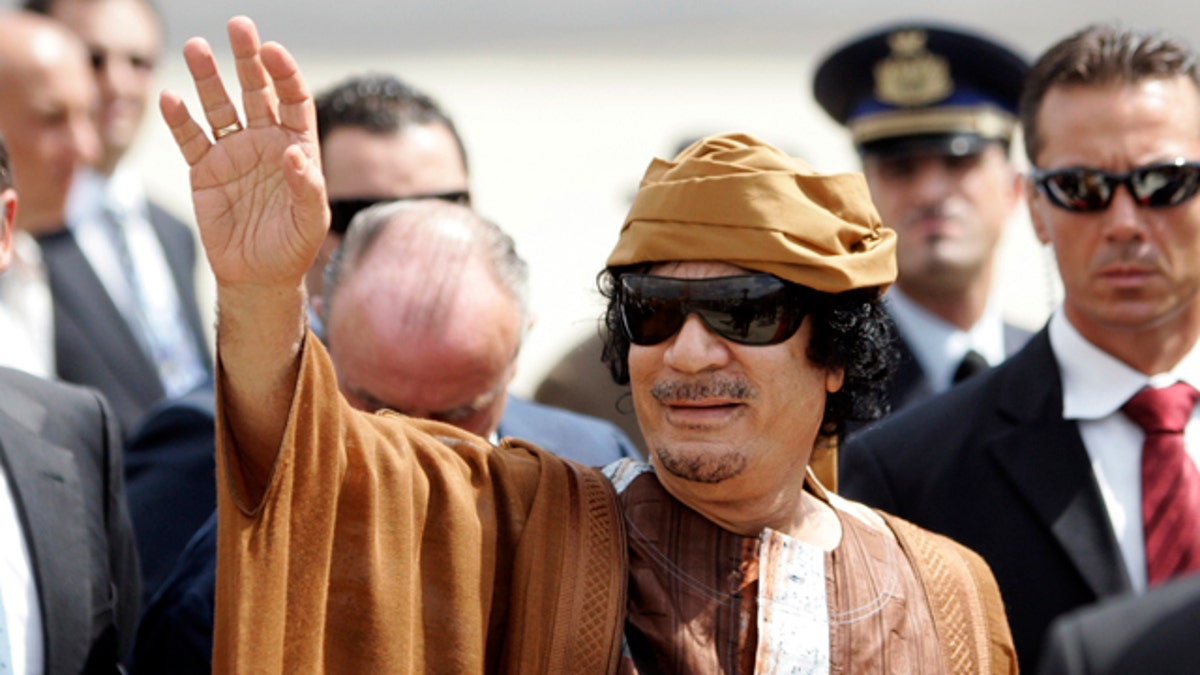
Aug. 29, 2010: Libyan leader Muammar Qaddafi gestures as he arrives at Ciampino airport, near Rome. (AP)
TRIPOLI, Libya – Thousands of jubilant Libyans danced and cheered in the streets of the rebel stronghold of Benghazi after the International Criminal Court issued an arrest warrant Monday for Muammar al-Qaddafi, accusing him of crimes against humanity for killing civilians who rose up against his rule.
The court order raised pressure on the Qaddafi regime, already targeted by daily airstrikes, and NATO clearly hopes it will encourage key allies to abandon him. But it also gives Qaddafi less incentive to accept a peaceful settlement that would see him leave power -- something he has shown no indication of doing -- because of the subsequent threat of arrest.
The court in The Hague, Netherlands, lacks police powers, and the force most likely to arrest Qaddafi appears to be the rebels battling to oust him.
At the United Nations, political affairs chief B. Lynn Pascoe said the rebels now hold a tenuous military advantage over Qaddafi's forces. The rebels have failed to penetrate the Libyan leader's center of power in Tripoli and conceded Monday they are unlikely to detain Qaddafi on their own.
Warrants were also issued for Qaddafi's son Seif al-Islam Qaddafi, whom he has groomed as his successor, and for Libyan intelligence chief Abdullah al-Sanoussi. All three men were accused of orchestrating the killing, injuring, arrest and imprisonment of hundreds of civilians during the first 12 days of an uprising to topple Qaddafi from power, and for tryinnts made for the happiest day in his life.
"We want Qaddafi to be tried in Libya in front of everyone. Even if we die, our children will do the job," he said. "We never felt like we are human beings until today."
The warrant was the second issued for a sitting head of state since the court began work in 2002. Judges have twice issued warrants for Sudanese leader Omar al-Bashir on charges of genocide, crimes against humanity and war crimes in Darfur.
The al-Bashir warrants underscore the court's key shortcoming: He has repeatedly exposed the impotence of a court without its own police force by traveling to friendly nations without being arrested. But he also has canceled other trips for fear he could be detained and sent to The Hague.
International war crimes prosecutors count on such isolation eventually marginalizing and weakening leaders to the point where they lose the support of important allies, paving the way for arrests.
Yugoslav leader Slobodan Milosevic ended up in court at the Yugoslav war crimes tribunal years after he was first indicted for fomenting the Balkan wars. Former Liberian leader Charles Taylor also has been brought before a war crimes tribunal in the Netherlands.
The White House called the court's decision one more indication that Qaddafi has lost his legitimacy. Spokesman Jay Carney said the ICC's action underscores the need for justice and for holding Qaddafi accountable.
NATO Secretary-General Anders Fogh Rasmussen echoed that sentiment in Brussels.
"It reinforces the reason for NATO's mission, to protect the Libyan people from Qaddafi's forces," he said, adding that the Libyan leader and his supporters need to realize that "time is rapidly running out for them."
NATO has been conducting daily airstrikes against military targets in Libya for the past 100 days under a United Nations resolution to protect civilians.
On Monday morning, loud explosions shook Tripoli. Libyan officials said two NATO missiles targeting Qaddafi's personal bus near his Bab al-Aziziya compound.
Journalists were taken to see a heavily damaged, burned out bus inside the compound two hours after the strike. It didn't appear to have been struck recently, however, since it was cool to the touch. No one was reported killed.
